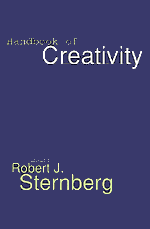Book contents
- Frontmatter
- Contents
- List of Contributors
- Preface
- Handbook of Creativity
- PART I INTRODUCTION
- 1 The Concept of Creativity: Prospects and Paradigms
- 2 A History of Research on Creativity
- PART II METHODS FOR STUDYING CREATIVITY
- PART III ORIGINS OF CREATIVITY
- PART IV CREATIVITY, THE SELF, AND THE ENVIRONMENT
- PART V SPECIAL TOPICS IN CREATIVITY
- PART VI CONCLUSION
- Author Index
- Subject Index
1 - The Concept of Creativity: Prospects and Paradigms
Published online by Cambridge University Press: 05 June 2014
- Frontmatter
- Contents
- List of Contributors
- Preface
- Handbook of Creativity
- PART I INTRODUCTION
- 1 The Concept of Creativity: Prospects and Paradigms
- 2 A History of Research on Creativity
- PART II METHODS FOR STUDYING CREATIVITY
- PART III ORIGINS OF CREATIVITY
- PART IV CREATIVITY, THE SELF, AND THE ENVIRONMENT
- PART V SPECIAL TOPICS IN CREATIVITY
- PART VI CONCLUSION
- Author Index
- Subject Index
Summary
If one wanted to select the best novelist, artist, entrepreneur, or even chief executive officer, one would most likely want someone who is creative. Indeed, today many CEOs are selected not for their pleasant personalities (it's hard to be perceived as pleasant when you may have to fire 20% of the company) or their learning and memory skills (they use computers or subordinates to remember the details for them), but for their creative vision of how to turn a company around.
Creativity is the ability to produce work that is both novel (i.e., original, unexpected) and appropriate (i.e., useful, adaptive concerning task constraints) (Lubart, 1994; Ochse, 1990; Sternberg, 1988a; Sternberg & Lubart, 1991, 1995, 1996). Creativity is a topic of wide scope that is important at both the individual and societal levels for a wide range of task domains. At an individual level, creativity is relevant, for example, when one is solving problems on the job and in daily life. At a societal level, creativity can lead to new scientific findings, new movements in art, new inventions, and new social programs. The economic importance of creativity is clear because new products or services create jobs. Furthermore, individuals, organizations, and societies must adapt existing resources to changing task demands to remain competitive.
- Type
- Chapter
- Information
- Handbook of Creativity , pp. 3 - 15Publisher: Cambridge University PressPrint publication year: 1998
- 204
- Cited by



